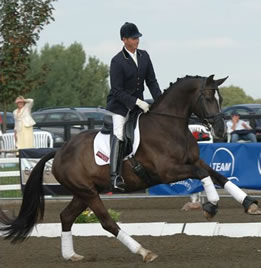RYG: What skills do you need to reach the top as
a dressage rider?
RYG: Although you're alone on your horse, is there
a team element to dressage?
Profile
Name:
Carl Hester
Born:
29 June 1967
From:
Gloucestershire
Event:
Dressage rider and trainer
Achievements:
- Carl has won 44 national dressage titles.
- National Young Rider Champion (1985)
- British Grand Prix Champion (1997-2004)
- Competed in three Olympics (1992, 2000, 2004)
- European Champion (1997-1999)
- Reached the World Cup Dressage Final (2005)
RYG: How important is it for a horse and rider to
work as a team?
CH: It's very important. A
talented rider can get on most horses and quickly assess
what the horse needs to feel in order to perform. In dressage
and all riding events it's usually the partnerships that
have been together the longest that will get the gold,
silver and bronze medals. Some of the top partnerships
have been together for 10 years or more.
It's not just a question of being able to get on and ride
the movements. You need to have a relationship with the horse.
That means being actively involved in caring for it. It also
means being involved in all aspects of the horse's training.
The longer you're together as a partnership, the more aware
you become of your weaknesses and your strengths. If your
horse is weaker in some areas than others, you learn how
to cover those up. That's why it's important that you work
as a team.
RYG: How does a rider communicate with their horse?
CH: A good rider can give
what we call aides in the stillness, or movement within
the stillness. That way it looks like you're not doing
anything, but in fact you're communicating with the horse
all the time.
An experienced rider will communicate with the horse through
their seat. That's an aide that you won't notice if you're
watching. You give your instructions through the lower leg
and the reins. A lot of that is developed from balance. You
have to be a very balanced rider to be able to sit in a way
which allows you to influence the horse without anyone seeing
it. That's what makes a very successful combination.
RYG: What's the difference between a good and a
great rider?
CH: A
great rider comes back year after year. A good rider is a
bit like your average pop star - they'll write a fantastic
song that goes to number one, but you never see them again.
It wasn't that they didn't have a good voice; they just couldn't
produce another record. It's the same with riding. The great
riders can be around for 30 or 40 years. You can still be
an Olympic rider when you're 50 or 60 years-old.

RYG: How do you deal with the nerves before a big
competition?
CH: When I was eventing I couldn't
control my nerves. I was always sick beforehand, so it wasn't
fun. With dressage I found I could actually enjoy riding
at the Olympics rather than being fearful.
Controlling the nerves is all about controlling your mind.
I learnt that very early on. I was given the opportunity
of riding for some respected owners so I thought, 'I've got
to do something about this.' I just switch off my mind until
it's time to compete.
When most riders are on a horse they're fine, it's when
you're waiting to go that you have time to think about things.
I decided to just shut those thoughts out completely.
